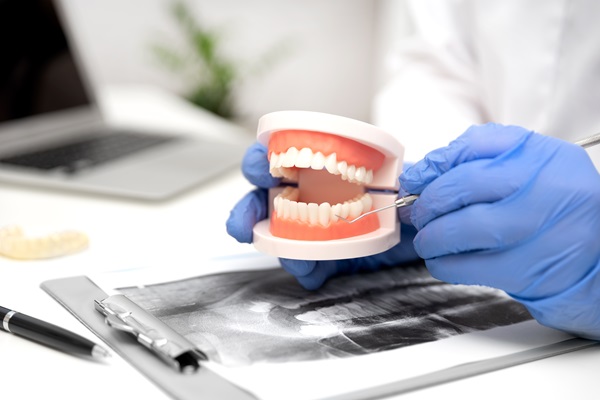How to Prevent Denture Stomatitis

Denture stomatitis can affect patients who wear dentures, bringing uncomfortable symptoms like redness and inflammation. However, there are simple ways to prevent this condition. From consistent oral hygiene to denture relines, patients can wear dentures comfortably and without any issues.
What is denture stomatitis?
Denture stomatitis is a fairly common condition that causes inflammation in the soft tissues beneath a set of dentures, most often on the upper palate. Although the term might sound serious, it usually does not cause pain at first, which is why it often goes unnoticed without routine dental care. It is most often linked to poor denture hygiene or wearing dentures continuously, especially overnight.
Denture stomatitis is not exclusive to older patients and may occur in anyone who wears removable dentures. While it is not considered a serious health issue, it can contribute to discomfort, alter denture fit, and increase the risk of further oral infections if left untreated.
Common symptoms and causes
Denture stomatitis develops gradually and may go unnoticed in its early stages. Some of the most common symptoms include persistent redness under the denture, swelling of the palatal tissue, and, in some cases, small red dots resembling a rash. Although typically not painful, a burning sensation or slight discomfort may occasionally be reported, particularly when consuming hot or spicy foods.
This condition is frequently associated with poor denture hygiene, which allows yeast to thrive beneath the appliance. Constant denture wear creates a warm and moist environment that promotes fungal overgrowth, making it important to take dentures out at night. Ill-fitting dentures that cause friction or pressure points may also compromise tissue health and increase susceptibility to inflammation. Additional risk factors include dry mouth, smoking, nutritional deficiencies, and systemic conditions such as diabetes, which can weaken immune responses and create an environment more prone to oral infections.
Medications that reduce saliva flow can exacerbate the risk. The same is true if a patient uses dentures without regular relining or adjustments. Even when dentures appear clean, microscopic biofilm can accumulate on them over time, leading to microbial imbalance.
Preventing denture stomatitis
Maintaining a clean oral environment and properly caring for dentures are the most effective ways to prevent denture stomatitis. These actions also help extend the lifespan and comfort of the denture itself. Here are five oral and denture care tips that can help reduce the risk of denture stomatitis:
- Clean dentures daily with a soft brush and non-abrasive cleanser — avoid using regular toothpaste
- Remove dentures at night to let oral tissues rest and stay healthy
- Rinse dentures after eating to clear food debris and reduce plaque buildup
- Soak dentures overnight in a denture-cleaning solution or clean water
- Stay hydrated to flush bacteria out of the mouth and, if needed, address symptoms of dry mouth
It is also important to visit the dentist regularly for checkups and cleanings. They can discuss when it is time to replace or reline dentures, such as if they become loose or cause pressure points. Not only are properly fitting dentures more comfortable, but they lower the chances of developing denture stomatitis.
Learn more about how to prevent denture stomatitis
With the right care and habits, denture stomatitis is easily preventable. A dentist can provide additional, more detailed prevention tips during an appointment. Contact our Astoria office today to schedule an appointment.
Request an appointment here: https://www.astoriacitydental.com or call Astoria City Dental at (718) 416-6421 for an appointment in our Astoria office.
Check out what others are saying about our dental services on Yelp: Dentures and Partial Dentures in Astoria, NY.
Related Posts
If you are missing several teeth on the jaw, you might consider opting for implant supported dentures. These offer an innovative solution to missing teeth and are considered more reliable than regular dentures. People were generally satisfied with replacing missing teeth with dentures. However, experts have incorporated a new and improved solution for missing teeth…
A dental crown is a common restoration that provides essential protection and structural support for damaged or weakened teeth. Over time, even the most durable dental crown can experience wear, misalignment, or develop issues that compromise your oral function and health. Here are five signs that indicate it is time to replace or refit a…
All-on-4® is a proven solution for missing teeth. Not only is it minimally invasive, but it is a popular alternative to traditional implants that many people seem to prefer. Whether someone has a few missing teeth or requires a whole new set, this is an option that could work for them. This approach requires titanium posts…
Searching for a new dentist near me can be overwhelming, especially when trying to find someone who meets one's clinical needs and personal preferences. Whether due to a recent move, a change in insurance, or a desire for better care, there are several important factors to consider when selecting a dental provider.One of the first…
